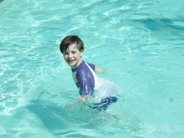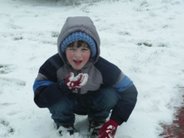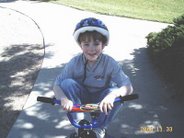I found the below information to post here to offer more insight into stimming. Please see my final thoughts below:
Stereotypic (Self-Stimulatory) Behavior[Stimming]
Written by Stephen M. Edelson, Ph.D.Center for the Study of Autism, Salem, Oregon
[The yellow(changed to orange here) highlighting of words is mine. --KF]
Stereotypy or self-stimulatory behavior refers to repetitive body movements or repetitive movement of objects. This behavior is common in many individuals with developmental disabilities; however, it appears to be more common in autism. In fact, if a person with another developmental disability exhibits a form of self-stimulatory behavior, often the person is also labelled as having autistic characteristics.
Stereotypy can involve any one or all senses. We have listed the five major senses and some examples of stereotypy.
Sense Stereotypic Behaviors
Visual: staring at lights, repetitive blinking, moving fingers in front of the eyes, hand-flapping
Auditory:tapping ears, snapping fingers, making vocal sounds
Tactile: Rubbing the skin with one's hands or with another object, scratching
Vestibular: Rocking front to back, rocking side-to-side
Taste: Placing body parts or objects in one's mouth, licking objects
Smell: Smelling objects, sniffing people
Researchers have suggested various reasons for why a person may engage in stereotypic behaviors. One set of theories suggests that these behaviors provide the person with sensory stimulation (i.e., the person's sense is hyposensitive). Due to some dysfunctional system in the brain or periphery, the body craves stimulation; and thus, the person engages in these behaviors to excite or arouse the nervous system. One specific theory states that these behaviors release beta-endorphins in the body (endogeneous opiate-like substances) and provides the person with some form of internal pleasure.
Another set of theories states that these behaviors are exhibited to calm a person (i.e., the person's sense is hypersensitive). That is, the environment is too stimulating and the person is in a state of sensory-overload.
As a result, the individual engages in these behaviors to block-out the over-stimulating environment; and his/her attention becomes focused inwardly.
Researchers have also shown that stereotypic behaviors interfere with attention and learning. Interestingly, these behaviors are often effective positive reinforcers if a person is allowed to engage in these behaviors after completing a task.
There are numerous ways to reduce or eliminate stereotypic behaviors, such as exercise as well as providing an individual with alternative, more socially-appropriate, forms of stimulation (e.g., chewing on a rubber tube rather than biting one's arm). Drugs are also used to reduce these behaviors; however, it is not clear whether the drugs actually reduce the behaviors directly (e.g., providing internal arousal) or indirectly (e.g., slowing down one's overall motor movement).
Copyright © 1995
(Okay..this I felt would provide more information to those who don't know anything about this type of behavior in autistic children and adults- NOW while I agree with using exercise as a means to help minimize stimming as it will work to a degree, I am not supportive of using drugs. AND exercise or drugs are not a "cure all" for stimming. Autistic people NEED to do these things in order to remain SANE in our world. STOPPING them from doing these things they need to do just to survive in fact would make it so they could not survive comfortably in our world. I don't see any point to that).
AND it has been proven time and time again, that even though for example Noah is stimming and does not appear to be listening or grasping a concept in school or here at home as he appears to NOT be paying attention to you or what you are saying, when tested on this later we find out he indeed DOES grasp and has heard what we have said. Even in preschool they questioned this and found out he indeed did catch things they were saying for example in CIRCLE TIME, even if he would not SIT in the circle but had to walk AROUND the circle the entire time.
Subscribe to:
Post Comments (Atom)


























 This website is part of the autism-assembly, this is a coalition of
members of the autistic community who share the common goal of seeking
acceptance for those on the autistic spectrum, who aim to educate about
autism, and who are not seeking a cure for autism. This is part of the
global autism rights movement.
This website is part of the autism-assembly, this is a coalition of
members of the autistic community who share the common goal of seeking
acceptance for those on the autistic spectrum, who aim to educate about
autism, and who are not seeking a cure for autism. This is part of the
global autism rights movement.



2 comments:
I want to say first how much of a relief it is to find that the little "quirks" that we have been noticing over time are being recognized and discussed by others. I too have a son, by the name of Noah, who exhibits a few of the typical signs of autism. These include the hand-flapping or having to have what we call at home a "twiggle toy" to rapidly shake or twitch in front of his face. Noah seems to have come out of the constant sniffing of objects. Yet, our greatest concern is his ability to learn and maintain an independent and socially balanced life. We are also concerned about the medical reports that vaccinations may have contributed to his condition. Maybe it was meant to be, but Noah seemed to be a very social, intellectually advanced child when he was younger. He was aware enough at the age of 8 months to understand a pause or, "turn the page," and know to actually turn the pages to a book. He knew his ABCs and 123s from 1-10 in English and Spanish by 18 months. He could even identify by shape octagons and trapezoids by 24 months. After two and entering daycare, socially, emotionally and intellectually (to a degree) he seemed to deteriorate. Short attention span, lack of eye-contact, tantrums which have ceased now (because I wasn't having it!), solitary play, limited verbal interaction unless he wants to, etc. How do adults with his degree of autism (which I'm told is on the very low end) function in our society with what they were given to function with and not have to ultimately live in a world on the outside things?
wow excellent comment! My Noah too seemed very advanced at an early age. He too knew numbers and colors to no end.....how to mix colors into new colors.....maps....roadways......all sorts of things.
I put him in preschool around 3-4 years of age....and it was a nightmare. He just did not do well but there were some positives that happened because of it. To be honest though after attempts at 2 kindergartens where he also did not do too well.....I chose to homeschool him for awhile....and that worked better as I could control his environment and nurture him......teach him and help him to learn in ways that were easier for him. Some of the schools even though they professed abilities to do so....did not wish to cater to his specific needs so much. They were all to anxious to try to get him to FIT IN immediately with the rest of the group.
I think eventually they can fit in easier and better.....but it has to be at their own pace. ANY forcing of anything never seems to work.....and they end up going backwards in most cases. Something we all try to avoid at any cost!
My Noah has made huge improvements....in just slowing things down......exposing him to more family social gatherings......more social play time......just doing more things socially. He has calmed down tremendously and thank goodness does not seem to get so overly emotional as he used to....I am thankful for that! They are exhausting for everyone involved!
Your son can learn. He can be a success.....and I am sure he will be! Our kids are very bright and smart and eager to learn and communicate.....but at their own pace in their own way. ONCE they get to do that for awhile.....they seem to be able to adapt at learning the way others learn a little easier.
I do wish you the best and thank you for your visit and comments!
Post a Comment